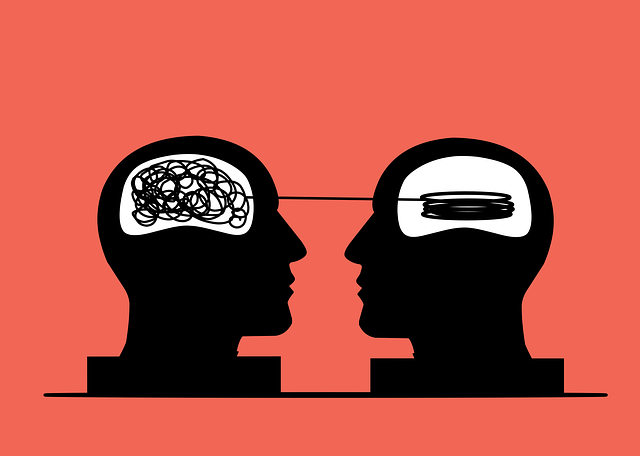Cultural competency is crucial for healthcare professionals in diverse communities, such as those served by Lakewood Mental Health Evaluations Therapy. It involves understanding cultural differences and values to provide effective care, foster trust, and tailor interventions to individual needs. Mental wellness journaling exercises enhance this approach, leading to better patient outcomes. Healthcare biases can result in disparities in mental health services, especially for underrepresented groups, so comprehensive education programs emphasizing cultural competency are essential. Lakewood Mental Health Evaluations highlight gaps in cultural sensitivity, advocating for training that combines theoretical learning with practical exercises and community outreach. Measuring success through self-reflection, peer feedback, and patient outcomes ensures continuous improvement in culturally sensitive therapy environments.
In today’s diverse healthcare landscape, cultural competency is no longer an option but a necessity. This comprehensive guide explores the critical role of cultural competency training for healthcare providers, focusing on strategies to enhance patient care, especially in settings like Lakewood Mental Health Evaluations. We delve into the impact of unaddressed cultural biases on treatment outcomes and present effective training methods, offering a roadmap for professionals to provide culturally sensitive therapy and improve overall patient experiences.
- Understanding Cultural Competency in Healthcare: A Necessary Framework
- The Impact of Cultural Biases on Patient Care and Outcomes
- Lakewood Mental Health Evaluations: Uncovering Cultural Sensitivity Gaps
- Effective Training Strategies for Healthcare Providers
- Measuring Success: Assessing and Improving Cultural Competency
Understanding Cultural Competency in Healthcare: A Necessary Framework

Cultural competency in healthcare is a foundational framework that enables medical professionals to provide effective and equitable care to a diverse range of patients. It involves understanding and appreciating the cultural differences, beliefs, and values that shape individuals’ health experiences and behaviors. In Lakewood Mental Health Evaluations and Therapy, where diverse communities are served, this competency is especially crucial. By recognizing and respecting these cultural nuances, healthcare providers can create a more welcoming and accessible environment for all patients, fostering open communication and trust.
This approach transcends mere language proficiency or knowledge of specific cultural practices. It requires mental health professionals to be aware of their own biases and to engage in continuous learning about different cultures. Moreover, effective cultural competency integrates into risk management planning for mental health professionals by ensuring that interventions are tailored to individual needs while considering the broader social and cultural context. Through Mental Wellness Journaling Exercise Guidance, practitioners can reflect on these dynamics and enhance their ability to deliver compassionate, culturally sensitive care. Additionally, promoting mood management strategies that align with cultural beliefs can significantly improve patient outcomes.
The Impact of Cultural Biases on Patient Care and Outcomes

Cultural biases can significantly impact patient care and outcomes, especially within healthcare systems like Lakewood Mental Health Evaluations and Therapy. These biases, often unconscious, influence how healthcare providers interact with patients from diverse backgrounds, leading to potential disparities in treatment. For instance, a provider’s preconceived notions about certain cultural practices or beliefs may result in miscommunication or even incorrect diagnoses. This can be particularly harmful in the mental health field, where understanding cultural nuances is crucial for effective therapy and support.
The presence of cultural biases can create barriers to access and quality care. Patients from underrepresented or minority groups might feel less inclined to seek help if they anticipate misunderstandings or judgments based on their cultural identity. This perpetuates a cycle where certain communities remain underserved, impacting overall public health. Therefore, implementing comprehensive mental health education programs that emphasize cultural competency is vital. By promoting awareness through public campaigns and providing guidance in journaling exercises, healthcare professionals can develop the sensitivity needed to offer tailored support, ensuring better outcomes for all patients, regardless of their cultural background, including those engaging in therapy at Lakewood Mental Health Evaluations and Therapy.
Lakewood Mental Health Evaluations: Uncovering Cultural Sensitivity Gaps

Lakewood Mental Health Evaluations highlight critical gaps in cultural sensitivity within healthcare systems. These evaluations often reveal a need for improved training and awareness among professionals, particularly in therapy settings. The process uncovers misunderstandings and stereotypes that can hinder effective care for diverse patient populations. For example, many patients may not feel comfortable expressing their emotional healing processes or building resilience if they perceive their cultural practices and beliefs to be dismissed or misunderstood by their healthcare providers.
This shortcoming is further exacerbated by the lack of community outreach program implementation, which could bridge these gaps. By integrating cultural competency training into mental health evaluations, Lakewood Mental Health Evaluations aim to foster more inclusive therapy spaces. Such initiatives are pivotal in ensuring that emotional healing processes are accessible and respectful of diverse cultural identities, ultimately enhancing patient outcomes and fostering stronger communities.
Effective Training Strategies for Healthcare Providers

Effective training strategies for healthcare providers should focus on creating immersive and interactive learning environments. Role-playing scenarios, case studies based on real-life challenges faced by Lakewood Mental Health Evaluations Therapy patients, and small group discussions can enhance understanding and empathy. Incorporating hands-on activities such as Mental Wellness Journaling Exercise Guidance or Coping Skills Development workshops allows providers to practice and refine their cultural competency in a safe space.
Moreover, integrating Community Outreach Program Implementation into training curricula exposes healthcare providers to diverse communities and their unique needs. This holistic approach ensures that providers are equipped not only with the knowledge but also with the skills to deliver culturally sensitive care. By combining theoretical learning with practical exercises, training programs can empower healthcare professionals to better serve their patients, fostering a more inclusive and effective healthcare environment.
Measuring Success: Assessing and Improving Cultural Competency

Measuring success in cultural competency training is paramount to ensure that healthcare providers can effectively serve diverse communities. Assessing cultural competence involves a multi-faceted approach, including self-reflection, peer feedback, and objective evaluations. Tools like Lakewood Mental Health Evaluations can play a crucial role by providing structured frameworks to gauge understanding and application of cultural competencies. These assessments help identify knowledge gaps and areas for improvement, enabling tailored training interventions.
Beyond assessment, continuous quality improvement is essential. By regularly reviewing patient outcomes, therapist self-awareness, and community feedback, mental health professionals can refine their practices. This iterative process, including risk assessments for mental health professionals, boosts confidence in serving diverse populations while enhancing mood management techniques. Ultimately, these efforts contribute to more inclusive, effective, and culturally sensitive therapy environments, such as those offered at Lakewood Mental Health Evaluations Therapy.
Healthcare provider cultural competency training is not just a recommended practice, but an essential tool in ensuring equitable patient care. As evidenced by the gaps uncovered in Lakewood Mental Health Evaluations therapy sessions, comprehensive training can significantly improve outcomes for diverse patient populations. By implementing effective strategies and measuring success through assessment, healthcare organizations can foster a more inclusive environment, mirroring the rich tapestry of their communities. This, in turn, strengthens trust and enhances the overall effectiveness of care delivery.














